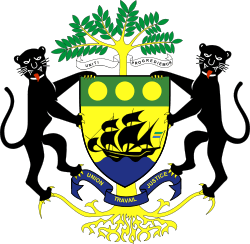Languages of Gabon
| Languages of Gabon | |
| Official language | French |
| National languages | Fang, and other Bantu languages |
| Other indigenous languages | (see below) |
| Lingua franca | French |
| Web site | Langues du Gabon.com |
The official language of Gabon is French, while 32% of the people speak Fang as a mother tongue.[1] French is the medium of instruction. Before World War II very few Gabonese learned French, nearly all of them working in either business or government administration. After the war, France worked for universal primary education in Gabon, and by the 1960-61 census, 47% of the Gabonese over the age of 14 spoke some French, while 13% were literate in the language. By the 1990s, the literacy rate had risen to about 60%.
It is estimated that 80%[2] of the country's population can speak the language and one-third of residents of Libreville, the capital city, are native French speakers.[1] More than 10,000 French people live in Gabon, and France predominates the country's foreign cultural and commercial influences. Outside the capital, French is less commonly spoken, though it is used by those who have completed a secondary or university education.
The indigenous languages are all members of the Bantu family, estimated to have come to Gabon about 2,000 years ago, and differentiated into about 40 languages. They are generally spoken but not written; while missionaries from the United States and France developed transcriptions for a number of languages based on the Latin alphabet starting in the 1840s, and translated the Bible into several of them, French colonial policy officially promoted the study of French and discouraged African languages. The languages continue to be transmitted through family and clan, and individuals in cities and other areas where different people may learn several Bantu languages.
The Gabonese government sponsored research on the Bantu languages starting in the 1970s.
The three largest languages are Fang, Mbere, and Sira (Eshira), each with about 25–30% of the speakers. The remainder of the languages are single-digit percentages, and some have only a few thousand speakers.
Education for the deaf in Gabon uses American Sign Language, introduced by the deaf American missionary Andrew Foster. (See Francophone African Sign Language.)
In October 2012, just before the 14th summit of the Organisation internationale de la Francophonie, the country declared an intention to add English as a second official language, reportedly in response to an investigation by France into corruption in the African country.[3] However, the spokesman for Ali Bongo Ondimba said: ""You know very well that once you leave the Francophonie space, if you do not speak English, you are almost handicapped. What is most interesting in the issue is the realization that French writers publish some of their materials in English, and that during international conferences, the French diplomats speak in English. If the French themselves are moving toward English, why would anyone expect the Gabonese not to?"[4] It was later clarified that the country intended to introduce English as a first foreign language in schools, while keeping French as the general medium of instruction.
Indigenous languages
- Baka (ISO code bkc)
- Barama (bbg)
- Bekwel (bkw)
- Benga (ben)
- Bubi (buw)
- Bwisi (bwz)
- Duma (dma)
- Fang (fng)
- Kendell (kbs)
- Kanin
- Sake (sag)
- Sangu (snq)
- Seki (syi)
- Sighu (sxe)
- Simba (sbw)
- Sira (swj), aka Eshira
- Northern Teke (teg)
- Western Teke (tez)
- Tsaangi (tsa)
- Tsogo (tsv)
- Vili (vif)
- Vumbu (vum)
- Wandji (wdd)
- Wumbvu (wum)
- Yangho (ynh)
- Yasa (yko)
- Fufu (yko)
References
- 1 2 Ouellon, Conrad. "Gabon" (in French). Retrieved 2012-11-19.
- ↑ (French) La Francophonie dans le monde 2006-2007 published by the Organisation internationale de la Francophonie. Nathan, Paris, 2007
- ↑ Duval Smith, Alex (9 October 2012). "Frosty relations with Hollande see Gabon break the French connection". The Independent. Retrieved 16 October 2012.
- ↑ "Gabon to introduce English as second official language". Xinhua. 3 October 2012. Retrieved 17 November 2012.
